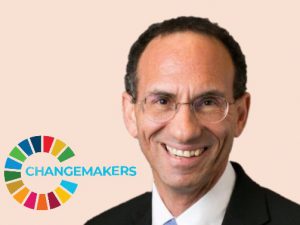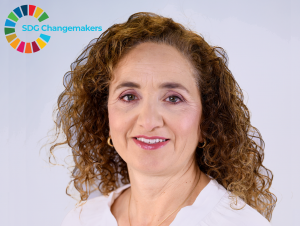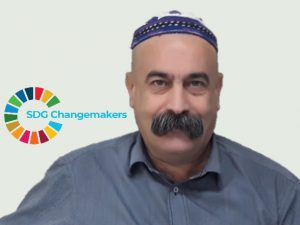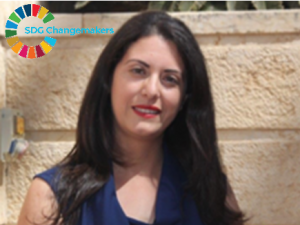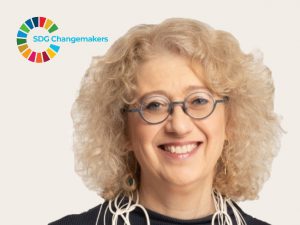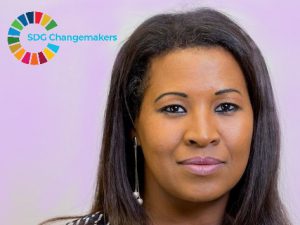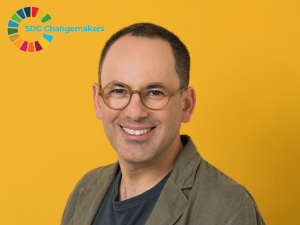Senior Director, Social Impact Policy, Israel Ministry of Foreign Affairs
SII: Please briefly describe your work
YY: I see my primary goal as promoting a vibrant working relationship between the Israel Ministry of Foreign Affairs (MFA) and our social equality governmental eco-system. It is becoming increasing clear that as one of Israel’s central ministries, the MFA can partner in myriad ways with numerous governmental bodies working hard to bring us closer to social equality. Israel is home to many important social impact initiatives from government, civil society and the private sector and we are in a unique position to share these activities with the international community. We have much to be proud of when it comes to social equality in Israel, including ongoing efforts to advance minority empowerment, upgrade employment and apply tech for social good. The public discourse, too, is quite robust – actually, often very loud – that, too, is a good thing.
SII: How did you get into this field?
YY: Quite simply: I felt there was a need. True, we at the Israeli Foreign Ministry have a strong social conscience – we’ve been government leaders in diversity and inclusion hiring since the 1980s, long before these finally became the norm – and work continuously to enable good Israelis doing good things to highlight their work on the global stage. Our representatives throughout the world are also on the alert for global initiatives that can bring social impact benefit to Israelis. At the same time, more and more people around us – in and outside the country – are “talking social,” and as diplomats we also need to speak that language in order to accurately represent the essence of our country as we move through the second decade of this century. We need to be in the know when it comes to Israelis in government working 24/7 to make our society better – and make sure that their accomplishments reach a wide audience around the world. I don’t feel I’m inventing a new wheel – just trying to nudge the existing one to the next level.
SII: Name three principle values that you associate with your work?
YY: 1) Helping the State of Israel evolve from “Start-Up Nation” to “Impact Nation.” When I say “Impact Nation” I particularly mean tackling burning domestic challenges like social equality and the environment, as well as sharing best practices in these areas with friends abroad – thereby impacting on the global arena in this context; that’s also the essence of the United Nations’ Sustainable Development Goals agenda. Beyond that, it is about maximizing Israel’s technological prowess for the common good – both in Israel and abroad – and making sure that the wellbeing of the individual is paramount.
2) Creating a more even playing field for all our citizens and integrating that into trends of inclusivity and diversity. When you look at the discourse in Israel, it becomes very clear that while we disagree about a lot there is consensus about the need for social equality that cuts across ideological and other divides. It’s a part of our historical DNA, of course; the whole concept of accessible health maintenance organizations – so valuable during the past year of crisis, especially – cooperative agricultural communities (like the kibbutz) and the social justice commitments made in our Declaration of Independence more than 70 years ago and implemented ever since are just a few examples.
3) Empowering those who are victims of inequality in Israel to advocate for themselves and bring the entire population to an equal standard. This trend goes back more than a decade, but we have to give former President Rivlin a lot of credit for putting it all on the table in his “Four Tribes” speech in 2015. He made a very powerful statement there: “To ensure the partnership between us, we must ensure that no citizen is discriminated against, nor favored, simply because they belong to a specific sector.” That speaks volumes. This resonated with so many Israelis.
SII: What particularly motivates you to make a difference?
YY: My own personal history and background. I come from a family with a tradition of immigration, multi-culturalism and blue-collar life. I grew up in a NYC housing project during the 1960s and 70s, a challenging period to say the least. My late father immigrated to the United States from India in the 1950s, a man of color who took his first steps in America in the Deep South and throughout his life was a proud union member (which I am as well). My mother’s parents came to New York from Eastern Europe at the start of the 20th century, a time when social equality was no more than a distant dream; my grandmother worked in a Lower East Side sweatshop, a reality experienced by many at the time and one that resonates to this very day. I continued the family tradition and moved to Israel; my wife’s parents also immigrated to the Jewish State – from Iraq, as refugees ousted from their homes and denied their citizenship after more than two millennia of continuous community life there. All this constitutes a rich and complex heritage inherited by our two adult daughters.
Throughout my own life experiences, I have repeatedly seen the quest for social equality – particularly felt by people of color – and can empathize with those who require assistance, often needed because of circumstances way beyond their control. I am proud that Israel, the country I’ve represented for more than three decades, is so focused on dedicating its resources to reducing inequalities and promoting social impact.
SII: What positive impact do you see emerging through your activity?
YY: Since we established our initiative there has definitely been increased interest both among our official representatives and activists in general about a full spectrum of activities and potential for cooperation, including “social impact diplomacy” and the role of Israel’s foreign service in promoting social equality. It begins with raising awareness and from there developing and leveraging partnerships and opportunities which can benefit all participants.
One example is some work we’ve done with Mariam Kabaha, our National Commissioner for Equal Employment Opportunities; she is Israel’s highest-ranking civil service official from the Arab community. In late 2019, right before this period of crisis, she conducted a working visit to Washington, DC and met with her counterpart in the US Administration; once international travel became challenging, we worked with her to arrange an online meeting with her German counterpart. Bringing Israel’s social equality professionals together with their counterparts abroad and facilitating a process of sharing best practices is definitely a vital part of “social impact diplomacy.”
Foreign Ministry representatives are also involved in assisting Israeli NGOs share successful models with communities abroad in fields as varied as increasing access for people with disabilities, promoting entrepreneurship among minorities as well as helping build resilience among trauma victims. All this is a win-win situation for our bilateral relationships.
When traveling overseas was still the norm, I myself had the opportunity to participate in the annual conference of a major American Jewish organization in Washington D.C. and was very encouraged by the level of interest in what I presented. Since that event we’ve been contacted by many others seeking to tap into our social impact activity and it’s my impression that this area is quite relevant to the present and future discourse about Israel.
SII: What is your favorite project?
YY: While hosting incoming delegations is of course a challenge in the current reality, I’m particularly intrigued by how visitors from abroad relate to social impact components included in their Israel trip itineraries. For example: after participating in a December 2019 visit of bloggers from the US and Europe, a Chicago-based participant wrote: “While they have their own challenges, I would say when it comes to inclusion, social impact, innovation and technology, Israel is leagues ahead of where we are and a country we truly should be learning from.” Following another visit at about the same time, by a group of political activists from the US, two participants told their organization’s annual conference that they were impressed by the example of women empowerment – among both Arab and Jew – that they saw in Israel. We’re increasingly witnessing this type of feedback about Israel in the social impact context and it’s quite exciting, especially since such visitors are exposed to Israel’s social reality in an organic and extremely transparent manner.
SII: Where are you headed in the future?
YY: My current trajectory, both professionally and personally, seems to point toward increased involvement in social impact activities in the Israeli context. At this point in my career and life, it’s particularly important for me to pay it forward and use everything that I’ve learned for the good of others. Thanks to my time at the Israel MFA, a truly outstanding institution doing sacred work, I’ve been blessed to meet amazing people along the way and develop a diverse toolkit. I’m especially looking forward to enhancing our activities and ties in the field of social impact diplomacy.
SII: Any tips for young people interested in getting into the social impact field?
YY: Statistics, studies and common wisdom all indicate that Gens Y and Z are already becoming a dominant presence in the labor force, public life and society in general. While my own peer group can be credited with some great developments, we also carry the burden of colossal mistakes; the younger generation is now faced with the consequences of all that. I realize the temptation of falling into despair, a sense that the social impact challenges are overwhelming. My advice is to get involved and take part, recognize that cooperation among all parts of the eco-system – including government! – can get the job done. And be consistent: it makes total sense to blame my generation for pollution, for instance – the facts definitely speak for themselves – but for matters to improve the younger generation needs to conduct itself better than we did, even if that means making personal sacrifices that aren’t always easy.
More about Ambassador Yehuda Yaakov:
A 30-year veteran of Israel’s foreign service, Amb. Yaakov established the Social Impact Policy initiative in September 2018 following his return from Boston where he served as head of mission to New England from 2014.
In previous Foreign Ministry positions abroad, Amb. Yaakov headed the Spokesperson & Public Affairs Division at the Israeli Consulate in New York and served as Deputy Head of Mission at the Israeli Embassy to New Zealand in Wellington.
Amb. Yaakov is also a board member of the non-profit “Olim Beyahad,” which is dedicated to empowering professionals among Israelis of Ethiopian background.
He is active on LinkedIn and Twitter (@YehudaYa).


